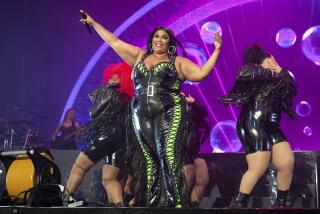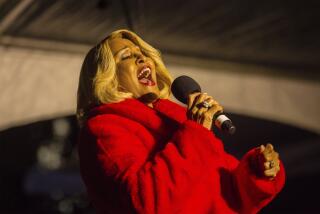How Courtney Love Lost Her Leverage, Settled Suit
Rock star Courtney Love strode into the Beverly Hills Hotel in late February for the recording industry’s hippest party: the annual pre-Grammy bash thrown by music mogul Clive Davis. When she walked into the hotel, she had been at war with her record company, Vivendi Universal’s Universal Music Group, for more than a year.
So it was all the more shocking to the music industry heavyweights present that night to see Love plop down in a chair next to Universal Music Group President Zach Horowitz and settle in for a two-hour heart-to-heart talk. It was the first step in a seven-month-long negotiation that resulted in a complex settlement this week that freed Love’s rock band, Hole, from its recording contract and cleared the way for Universal to release new recordings by Nirvana, the iconic grunge rock band led by Love’s late husband, Kurt Cobain.
The two sides did not reach a settlement based on personal contact alone. Sources close to Love say she felt pressure to settle after losing a series of legal rulings in Los Angeles County Superior Court and felt her remaining leverage slipping away. Love also was facing legal bills in a separate lawsuit with the two surviving members of Nirvana.
Love sued Universal in February 2001, accusing her record company of using unlawful business practices to keep her locked into an unfair contract and cheat her out of royalties. Universal blasted Love’s claims as a publicity stunt and a negotiating ploy. The singer vowed to take the case to the Supreme Court if necessary to help the artists’ rights cause.
Love then filed another lawsuit to block Universal or her late husband’s former bandmates from releasing any Nirvana recordings. The two musicians, drummer Dave Grohl and bassist Krist Novoselic, countersued and accused Love of trying to wrest away control of Nirvana for use as a weapon in Hole’s contract dispute with Universal.
At Davis’ Feb. 26 party, as Love entered the hotel ballroom, her legal problems were near their peak. She was spotted by Lyor Cohen, chief of Universal’s Island Def Jam label.
Cohen approached Love and brought her over to a table full of Universal’s top executives. He seated her next to Horowitz, whom Love had never met.
“It was kind of a practical joke,” Cohen said. The moment was so uncomfortable that several Universal executives left the table. But then, the rock star and the executive began to chat.
Love told Horowitz that she believed marketing executives at Universal’s Interscope Records had broken their promises in the marketing of Hole’s album “Celebrity Skin,” which sold about 1.3 million copies, far below expectations.
“It was the first time there was a Universal executive willing to listen to what she had to say,” said James Barber, Love’s manager. Horowitz declined to comment Thursday.
Horowitz prodded Love to consider a deal and continue her career, sources said. The two parted still facing a court showdown. But the ice had been broken.
At the time, Love also was becoming isolated from the artists’ rights campaign her lawsuit had helped spark. The night of the party, the Recording Artists Coalition was staging a series of concerts with Elton John, No Doubt and other acts around L.A. to raise money for its campaign for fairer contracts and more accurate accounting of royalty payments. RAC sources say Love was invited to play a concert and declined; Love says she wasn’t invited.
What’s more, Love’s most powerful leverage against Universal--her role in the partnership that controlled Nirvana’s music--had begun to erode. Technically, it was unrelated to Hole’s dispute, but Love held an apparent ace: claims to an unreleased, and potentially lucrative, Nirvana tune believed to be the last song recorded by Cobain, “You Know You’re Right.”
Under Nirvana’s record contract, the band was required to deliver a boxed-set CD package in time for the holidays last year. Love, however, had pitched the idea of instead releasing a single greatest-hits CD, including the unreleased song. Universal believed Love’s approach would result in the sale of 5 million units, far more than a boxed set. But both sides had to agree to amend the Nirvana contract.
Lawyers for the record company and the Nirvana partners reached the broad terms of a deal by last fall, sources said, but failed to sign it in time to release the CD for Christmas. In the meantime, Los Angeles County Superior Court Judge Fumiko Wasserman threw out Love’s broadest claims against Universal, reducing the lawsuit to a more conventional contract dispute. Wasserman ordered the two sides into mediation this summer.
During the mediation, sources said, Love and Horowitz met again--this time privately. By then Universal had raised the possibility of putting out a Nirvana CD without “You Know You’re Right.” The company “tied the two [cases] together,” according to one lawyer familiar with the situation.
In the end, the tactic pinned Love in a corner: No longer did she have the leverage of withholding the song; Universal was ready to make do without it. By late summer, Love’s camp began fearing the song would leak to the Net, potentially diminishing its value--and her leverage--even further.
Already reeling from the judge’s rulings and her legal bills, Love decided to accept a deal. Love was freed from her record contract, received ownership of Hole’s unreleased material and is to receive a $4-million advance against sales of new Nirvana recordings.
Barber, Love’s manager, said his client pressed the matter as far as she could given the circumstances.
“The industry reforms that really matter to Courtney, and other artists, are almost impossible to do in a single contract case,” he said.
More to Read
The biggest entertainment stories
Get our big stories about Hollywood, film, television, music, arts, culture and more right in your inbox as soon as they publish.
You may occasionally receive promotional content from the Los Angeles Times.







